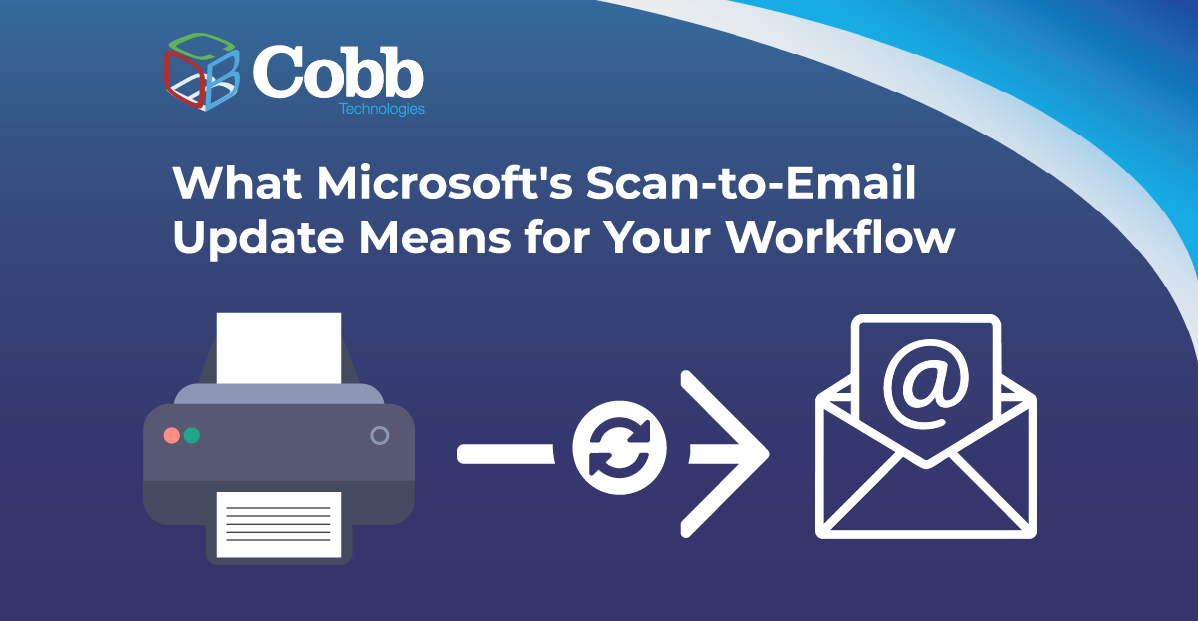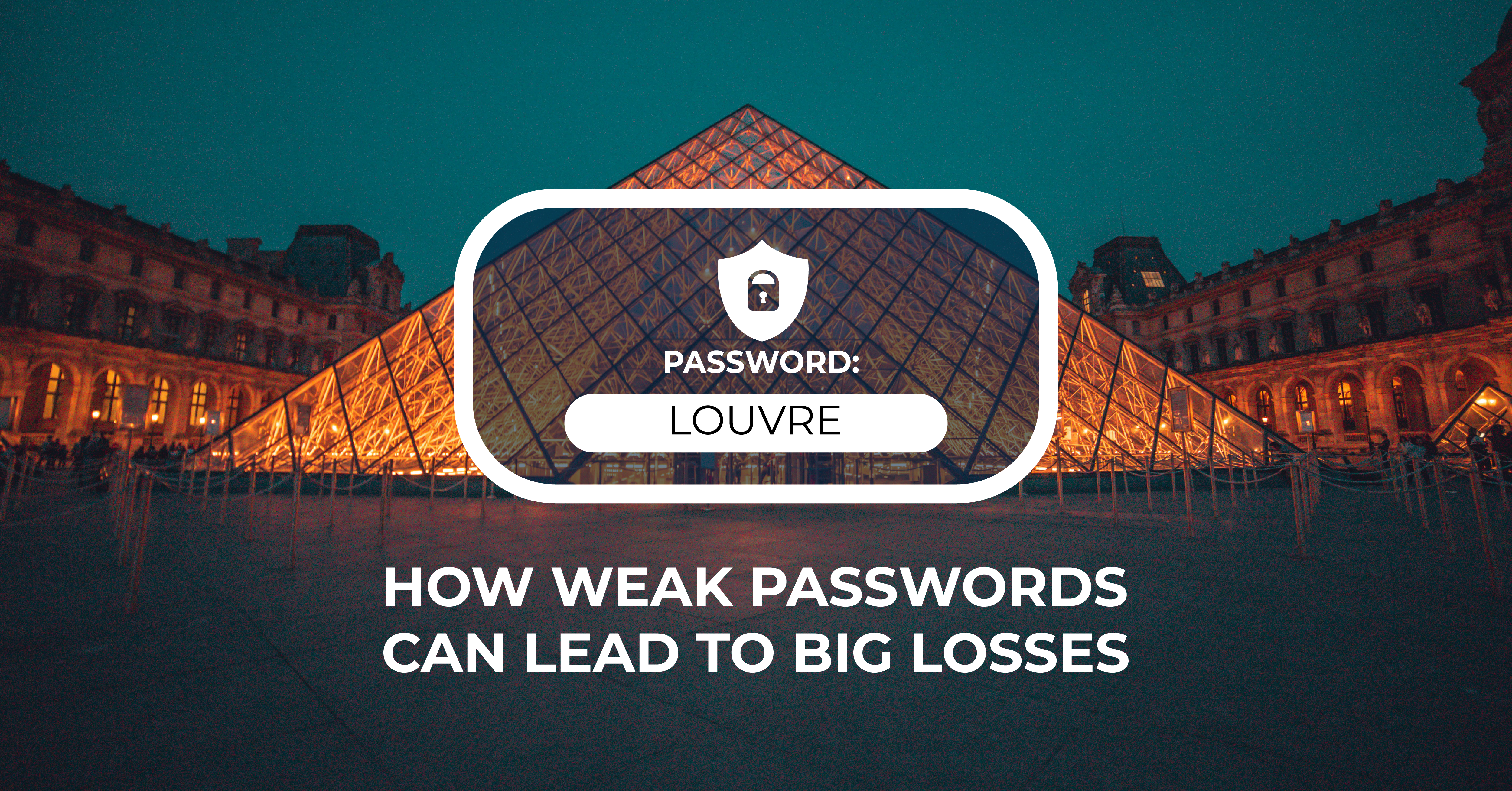10 min read
What Microsoft's Scan-to-Email Update Means for Your Workflow
There is a major email security update from Microsoft that will disrupt scan-to-email workflows for many businesses unless action is taken before...

Voice Over IP telephony is a powerful tool that will streamline the way your medical practice communicates.
VoIP is a modern alternative to traditional landline telephone systems, and due to its flexible, internet-based technology, it’s able to offer an ever-growing list of features that provide its users with so much more than just audio communication.
Hi, I’m Jason Holmes, IT Solutions Specialist with Cobb technologies. In this video, I’m going to outline three key ways VoIP benefits medical practices.
Providing support and building trust are foundational to the medical profession, which is why the simplest way to improve your patient’s experience is by providing them with simple, reliable communication.
Many medical practices now offer direct messaging or video conferencing services to patients. VoIP is uniquely suited to this increase in mobile communications, as it allows nurses and doctors to perform these services using a single platform. Whether they’re video conferencing with a patient through the VoIP software on their office laptop or desktop, or they’re using the VoIP app on their phone to video chat from home, the doctors and nurses at your practice will be able to quickly, easily, and securely connect with patients regardless of where they are.
Medical office staff juggle countless responsibilities, thankfully, VoIP can bear some of that load. You can seamlessly connect your VoIP system to your CRM, and take advantage of features like call screening, which lets your receptionists pull up patient information as soon as patients call in, allowing staff to get ahead of the rush and see to patient needs as soon as possible.
Additionally, using virtual receptionist features like auto-attendant or immediately provides your patients with a menu of options so that they can communicate their needs as soon as they dial in, whether it be something like a prescription refill or canceling an appointment, rather than having to wait on a live person on the other end to connect them with the relevant party. Auto-attendant can also provide callers with critical information like office hours, inclement weather closings, and new patient induction procedures.
Also, if your practice does not provide emergency services, auto-attendant can be used to identify those emergency calls and then direct them to a more relevant number.
Communication doesn’t stop at voice - with VoIP technology your office can send text reminders to your patients letting them know when their next appointment is or if a payment is due. Faxes sent to your office can be forwarded to an email inbox so that you can handle communications electronically, keeping your patient’s critical data safe.
Medical practices rely heavily on phone systems to communicate, which is why it's important to strengthen and centralize communication structures throughout your organization.
Using VoIP allows you to unite your medical practice communication, even if it’s physically spread across more than one location. Having a unified phone system that lives in the cloud enables you to seamlessly transfer calls from one office to the next by simply dialing an extension. This ease of use also translates to single-office locations - simply dial an extension to transfer a call that came into the front desk, over to a specific examination room, with no interruptions.
VoIP systems allow for better control. VoIP is flexible, scalable, and comparatively easy to install - a majority of the VoIP installation process is typically done remotely. Things like moving office locations or completing a branch expansion are made a lot simpler with VoIP. Plus, upgrades are largely software-related and can be done remotely, not requiring IT specialists to come in and physically update the hardware.
And, unlike with a landline, you won’t have to bring in IT people to set up your phone system’s custom properties, nor will you have to reach out to the phone company to pull call records. VoIP enables you to have complete control over your communication features and records.
And while we’re talking about records, most VoIP providers will securely store data in the cloud. If an incident occurs, whether it’s a natural disaster, or a breach, or a burst pipe in your server room, having your records in an offsite data center protects your information.
Additionally, most VoIP providers have voice disaster recovery, allowing your communications to continue by providing alternate backup systems that ensure your telecommunications are up and available around the clock.
VoIP has cost-saving benefits as well - we’re going to start with two less obvious examples: record keeping in the event of a patient complaint or if they’ve chosen to pursue legal action, also, video conferencing.
Like I mentioned earlier, VoIP keeps excellent records of your communication, and it makes reporting easy. Issues brought about by miscommunication - whether they’re a confused and frustrated patient or a malpractice suit - will have been well-documented and available for review.
Plus, cutting down on in-person meetings and instead hosting more video conferences cuts down on the cost of hosting in-person meetings - things like transportation costs, facility costs, and catering costs. More importantly, it lets you wear your comfy bunny slippers to the conference.
Finally, local and national calls made using VoIP systems are dependably cheaper than landlines - you eliminate per-minute and long-distance rates. And, when you replace a traditional landline service with VoIP you’re able to remove unneeded dedicated phone lines that were rarely used but still cost your practice money.
Medical offices are commonly targeted by cybercriminals. Your patients’ confidential information is a veritable goldmine containing practically everything a criminal would need to commit identity theft.
Yes, hackers will try to breach your computers, but they can also target your phone systems. Thankfully, there’s a way to safeguard against this with VoIP. A good VoIP provider will implement security measures that uphold current cybersecurity standards, and they will regularly test and update these measures to ensure that your business is protected against the latest security threats.
Furthermore, some VoIP providers bill themselves as HIPAA compliant and will configure your VoIP system to meet HIPAA guidelines. VoIP helps you retain your patients’ trust by making sure the phones on your network adhere to data security protocols.
VoIP technology is continually evolving, with providers offering new features that enhance productivity and efficiency regularly. If you want to learn more about just how VoIP works as well as a more detailed breakdown of commonly available features, check out Cobb Technologies DOT com.

10 min read
There is a major email security update from Microsoft that will disrupt scan-to-email workflows for many businesses unless action is taken before...

11 min read
Why should a law firm invest in a strong modern IT strategy? Today’s legal teams depend on secure, reliable technology to protect sensitive...

2 min read
The Louvre’s password became the punchline of a global story after a heist revealed major security concerns for the museum. Reports say the password...